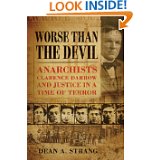“The Past Is a Foreign Country” — Or Is It?
 I’ve recently finished reading Dean Strang’s fascinating new book, “Worse Than the Devil: Anarchists, Clarence Darrow, and Justice in a Time of Terror.” The book recounts the story of a once-famous (or infamous) criminal case that was tried in Milwaukee nearly a century ago. The case arose from a short, armed skirmish between police and residents of Milwaukee’s largely Italian, working-class Bay View neighborhood in September 1917. In the wake of that violence, police indiscriminately arrested dozens of Italian immigrants, ultimately resulting in the trial of eleven suspected anarchists in November 1917 on charges of assault with intent to murder.
I’ve recently finished reading Dean Strang’s fascinating new book, “Worse Than the Devil: Anarchists, Clarence Darrow, and Justice in a Time of Terror.” The book recounts the story of a once-famous (or infamous) criminal case that was tried in Milwaukee nearly a century ago. The case arose from a short, armed skirmish between police and residents of Milwaukee’s largely Italian, working-class Bay View neighborhood in September 1917. In the wake of that violence, police indiscriminately arrested dozens of Italian immigrants, ultimately resulting in the trial of eleven suspected anarchists in November 1917 on charges of assault with intent to murder.
America’s recent entry into the First World War had already created a public atmosphere that was hardly favorable to immigrants and political dissidents, but a terrible local tragedy may have wiped out any remaining hope that the defendants would receive a fair trial. Just days before the jury was selected, a bomb exploded in a Milwaukee police station, killing ten — America’s single greatest loss of officers in the line of duty before 9/11. Although the Bay View defendants were not formally charged with this crime — indeed, the case was never solved and no one was ever formally charged — the bombing was widely believed to be the work of the defendants’ supporters.
Little wonder that all of the defendants were convicted on a dubious conspiracy theory in a trial that reeked of pro-prosecution bias from start to finish.

 The perennial topic of the foibles of legal academic publishing is back in the news, thanks to a
The perennial topic of the foibles of legal academic publishing is back in the news, thanks to a